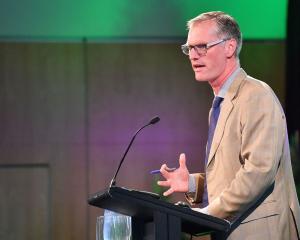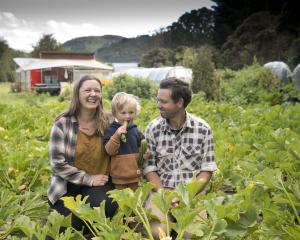
Turley Farms co-owners Murray and Margaret Turley have turned dryland crop and stock properties into high-value vegetable and arable operations in the past and built up agri-business shareholdings in the region.
Now they’re investing in apple-growing and after running a trial with various varieties have settled on the bite-sized fruit managed and marketed by Rockit.
The Turley Rockit partnership has planted a 20-hectare orchard with plans to bring in other investors to grow the Rangitata site to 100ha.
"We are always looking for the next land use change and pipfruit seemed to have a fit for South Canterbury," Mr Turley said.
"We did the research, planted the trial orchard and our agronomist did a great job of taking that through to show what can happen. We’ve studied the growing degree days and climate as far as inversion layers and that sort of thing so with a good supply of water we seem to think it’s worth having a go at a new challenge."
He said apple trees were relatively light on water under trickle irrigation, without the peaks of some grass and cereal crops, and showed potential in extracting value from water.
The Turleys sent their agronomist Dominic Cosgrove to Hawke’s Bay to see if apples were right for them. A trial orchard planted in eight varieties in 2021 was followed by another six varieties last year.
"It’s given us a good insight into what can be done and probably some finer points to the growing structure that we probably learned to take forward to the large [Turley Rockit] orchard."
Mr Turley said they liked to do their homework before investing in large ventures, investigating soil types for potato growing before moving to Mid Canterbury’s Chertsey area in 1993.
He said apple growing had advanced since then with changes in growing structures to make it a repeatable process for staff, higher planting densities and lending itself to perhaps robotics in the future.
The 2D growing system used by Rockit appealed as it produced more fruit from a smaller area.
Projected returns for Rockit apple growing were attractive.
"We are a while off getting full maturity so a lot could happen with the price of fruit and we would be back on yield compared with Hawke’s Bay so there’s a few unknowns there, but we think the profitability stacks up and hence why we are doing it."
Developing the Turley Rockit orchard, completed in September, was a big job, he said.
Favouring the investment was the orchard’s scale on a large greenfield site and efficiencies from putting in long rows of densely planted trees.
Eventually, local staff and likely Recognised Seasonal Employer (RSE) workers will be recruited for the orchard as they have for an onion packhouse.
Mr Turley said the partnership with Rockit was a good fit.
"Their marketing philosophy and snack-type convenience food [won us over] as it’s a trend at the moment pretty much to the fore. And I think it’s just the uniqueness of it and a lot of it comes down to marketing and trying to capture as much return as you can and we think Rockit can achieve that for us."
The partnership follows on from the family collaborating with other investors in agri-business.
A 20% shareholding was bought in 2012 in Dairy Holdings, which runs 63 dairy farms and 20 support blocks.
Another venture is a 40% shareholding in Farmers Mill, which produces flour for Griffins NZ, along with other bakery customers, and allows local growers to mill their own wheat. The couple are among founding shareholders of the Onion processing plant, Southern Packers and have a 25% stake in the business.
The Turleys also run a 1900ha operation based at Temuka, producing cereals, potatoes, onions, hybrid vegetable seeds of carrots, canola, radish and red beet and ryegrass and white clover for seed.
Mr Turley said they were always up for a new challenge and could yet take on further opportunities suiting their climate and soils.
He said they had continued building business interests as they liked working and collaborating with other farmers and business people.
He said he was a grower at heart who enjoyed the challenges of business and working with like-minded people.
Rockit Global chairman John Loughlin said horticulture had the potential to transform rural Canterbury in the next 20 years.
"Growing apples uses significantly less water, requires markedly lower nitrogen inputs than either dairy or arable production and, as a perennial crop, doesn’t require annual cultivation."














